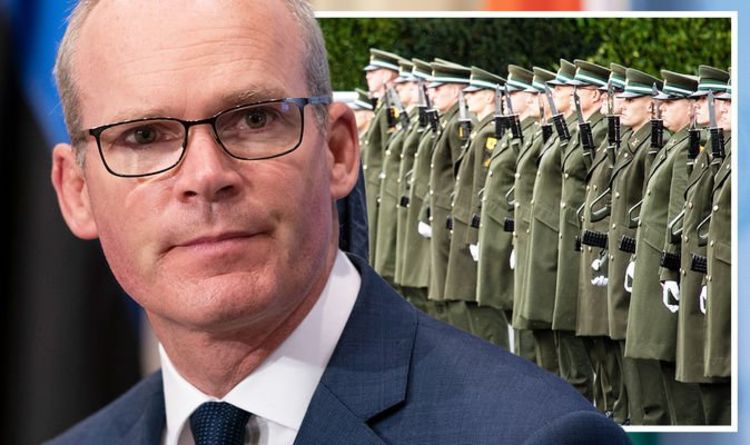Russian military exercises ‘not welcome’ says Simon Coveney
We use your sign-up to provide content in ways you’ve consented to and to improve our understanding of you. This may include adverts from us and 3rd parties based on our understanding. You can unsubscribe at any time. More info
In a draft report into the future of the Irish military, the Commission on the Defence Forces found “striking gaps” in the nation’s ability to police its air space and controlled waters. It follows an admission in 2020 by Simon Coveney, Ireland’s Minister for Defence, that Ireland did not have a primary radar system for detecting potential belligerent aircraft and vessels.
Instead, Ireland has to rely on NATO navies for surveillance.
According to the Stockholm International Peace Research Institute, in 2020 Ireland spent just 0.3 percent of its GDP on its military, the smallest proportion in Western Europe.
Its military budget for the year was $1.1billion (£853million). Comparatively, the UK spent $59.2billion (£44.2billion).
Ireland’s defence budget has been steadily increasing since 2014, data shows. However, in that 6-year period the increase was only $105million (£78.3million).

The Sunday Independent reports today (Sunday) that the report will recommend the most far-reaching reforms of the Defence Forces to date.
These include a potential reduction to peacekeeping missions – which it says places a significant strain on the Irish army.
It will also call for renaming the Irish Air Corps and Naval Service, as well as asking for the military budget to be trebled.
The draft report, which is due to be finalised and delivered to Mr Coveney this coming week, is understood to admit that Ireland “is not equipped, postured or realistically prepared to conduct a meaningful defence of the State against a full spectrum force for any sustained period”.

It adds that Ireland can expect to face a growing risk of becoming a target of foreign aggression.
Yesterday (Saturday), Mr Coveney announced that a Russian military drill had been relocated outside Ireland’s exclusive economic zone, following outcry from fishermen.
In order for the Defence Forces to be able to defend Ireland, the commission is said to have set out three options for funding.
Two such options involve increasing the defence budget from anywhere between 50 and 300 percent over the coming decade.
DON’T MISS
UK considering ‘major military offer’ to Europe [INSIGHT]
Maddie McCann mystery blown open: new ‘shocking’ evidence uncovered [REPORT]
Boris set to land HUGE new Brexit trade deal worth BILLIONS [ANALYSIS]

The cheapest option – maintaining the status quo – would leave the Irish military unable to defend the country, the Commission says.
A 50 percent increase in the defence budget would allow for primary radar capability – something which the report says is a clear weakness in Ireland’s national defence.
In March last year, Paul Brandon, head of corporate affairs for the Irish Aviation Authority (IAA), wrote to the Commission expressing concern about the lack of the radar system.
He said: “The Defence Forces should have full capability to detect potential aircraft infringements into our national airspace.

“At the moment, the IAA are doing some monitoring and reporting to the Department of Transport; however, the IAA believes it would be best practice for the Defence Forces/Department of Defence to have a role in the monitoring, reporting and classification of these occurrences.”
The Commission – which was set up in December 2020 – is also expected to recommend a radical overhaul of the command structure of the Irish military.
It will call for the creation of a new Chief of Defence and a joint strategic headquarters for commanders of the armed forces to report to – making the Chief of Defence the overall commander of the military.
However, this would require legislative change.
It is also said to recommend a significant improvement of cyber intelligence capabilities with the establishment of a new Information Command.
Source: Read Full Article





